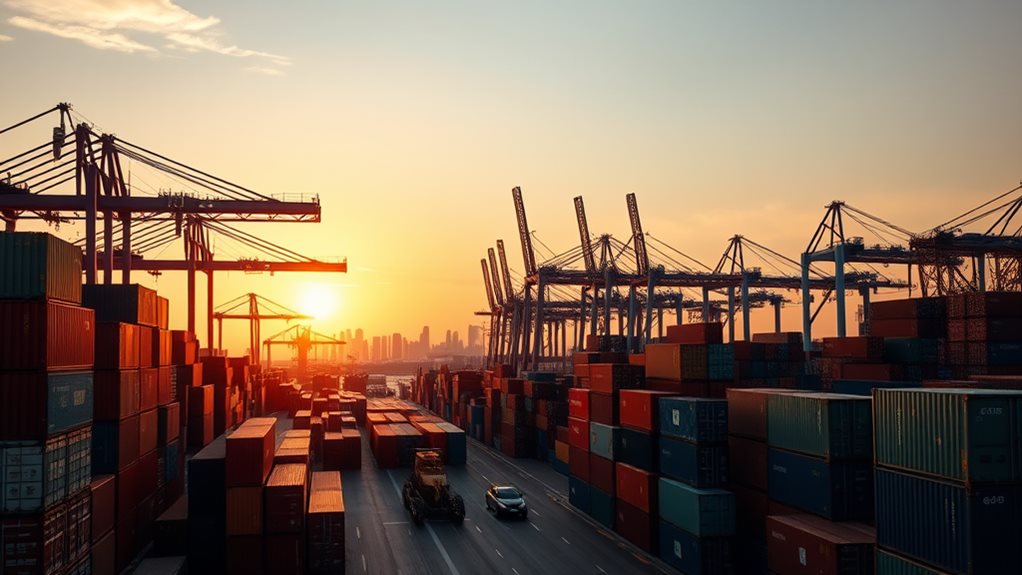International Relations and Trade Agreements (Impact on Various Sectors) International Relations and Trade Agreements (Impact on Various Sectors)
You’re maneuvering a complex web of global trade agreements, where international relations play an essential role in shaping various sectors. As diplomatic ties shift, so do market access and export opportunities. Look at agriculture: favorable trade deals can boost crop yields and exports, while strained relations can raise production costs. You’re left wondering how this ripple effect impacts manufacturing, services, and tech – and what’s at stake for labor standards and innovation. As you explore how global dynamics shape industries, consider gaining exclusive insights into emerging trends in luxury hospitality, alongside exciting opportunities like casinos confiables para jugar con dinero real en 2024, which blend global entertainment with high-end experiences.

Trade Agreements and the Agricultural Sector
While trade agreements may seem unrelated to agricultural practices at first glance, they can greatly impact the agricultural sector.
You’ll notice that tariffs, quotas, and subsidies can affect the competitiveness of your agricultural products in the global market. For instance, export subsidies can unfairly advantage certain countries, making it difficult for your sustainable agriculture products to compete.
On the other hand, free trade agreements can expand market access and create new opportunities for your agricultural exports. By removing trade barriers, you can increase efficiency and productivity, ultimately contributing to the growth of your agricultural sector.
Data shows that countries with favorable trade agreements tend to have higher agricultural export values, demonstrating the significance of trade agreements in shaping the agricultural sector.
The Impact of International Relations on Manufacturing and Industry
As countries navigate the complex web of international relations, you’ll find that these dynamics can greatly influence the manufacturing and industrial sectors.
The state of global supply chains is a key factor, as diplomatic tensions and conflicts can disrupt the flow of raw materials and intermediate goods.
You’ll notice that trade barriers, such as tariffs and quotas, can also have a significant impact on manufacturing operations. A rise in protectionism can lead to higher production costs and reduced competitiveness in the global market.
On the other hand, strong diplomatic relationships can foster cooperation and facilitate the exchange of technology and expertise, driving innovation and growth in the manufacturing sector.
Effective management of international relations is essential to maintaining a stable and efficient global supply chain.
Navigating the Effects of Trade Deals on the Service Sector
You’ve seen how international relations can greatly impact the manufacturing sector, but the effects of trade agreements don’t stop there.
Trade deals also considerably affect the service sector, which accounts for a substantial portion of many countries’ GDP. When negotiating trade agreements, governments often focus on reducing trade barriers to facilitate the growth of their service sector. They may aim to simplify regulatory frameworks, relax visa requirements for professionals, and increase transparency in licensing procedures.
Effective trade agreements can stimulate service sector growth by increasing market access and encouraging investment. As a result, trade agreements play an essential role in shaping the global service landscape.
How International Relations Shape the Technology and Innovation Landscape
Because technology and innovation are critical drivers of economic growth, governments increasingly recognize the importance of international relations in shaping the global technology landscape.
You see how countries with strong international ties tend to have better access to foreign technologies and talent, enabling them to build more competitive innovation ecosystems.
Technology transfer agreements, for instance, facilitate the sharing of knowledge and expertise between nations, leading to breakthroughs in fields like renewable energy and biotechnology.
By fostering cooperation and collaboration, governments can create an environment that encourages entrepreneurship, attracts investment, and drives innovation.
As a result, you can expect countries with effective international relations to be at the forefront of technological advancements.
Effective technology transfer and healthy innovation ecosystems are key to their success.
The Human Element: Labor, Employment, and Trade Agreements
Beyond the domain of technology and innovation, a country’s effectiveness in international relations plays a notable role in shaping another vital aspect of its economy: labor and employment.
You’ll find that a country’s strength in international relations directly impacts its ability to negotiate favorable labor standards and protect workers’ rights. Trade agreements, in particular, can greatly affect labor rights and employment standards.
You need to examine the interplay between international relations and labor laws. Stronger labor rights and higher employment standards are often linked to countries with robust international relations.
Conversely, weak international relations can result in relaxed labor laws and lower employment standards. Analyzing data reveals a notable correlation between a country’s success in international relations and the robustness of its labor laws.